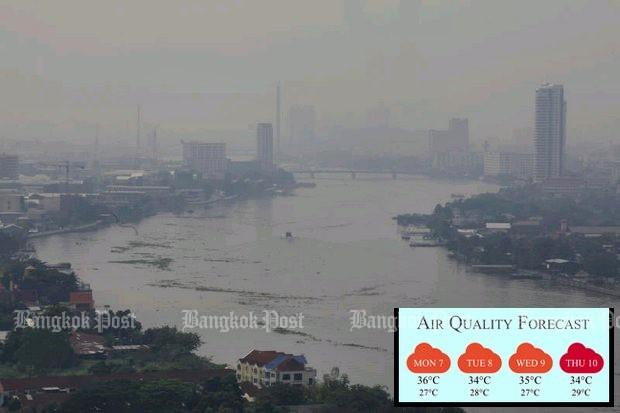Haze returns to city as long holiday ends
published : 7 Jan 2019 at 08:24
writer: Gary Boyle
ORIGINAL SOURCE/WRITER: Post Reporters

Air pollution caused by dust is set to worsen again in the capital, the Pollution Control Department (PCD) has warned.
The ultrafine dust returned to Bangkok on Sunday, with 21 areas reporting air pollution exceeding the "safety limits", according to the PCD's official release.
After clear blue skies during the New Year holiday period, the capital's skyline was once again shrouded in smog Sunday morning.
An influx of vehicles driven by those returning from out of town coupled with dry weather and poor air circulation were blamed.
The PCD's air monitoring station found 21 roads where levels of airborne particulate matter of up to 2.5 micrometres in diameter (PM 2.5) exceeded the acceptable Thai standard of 50 microgrammes per cubic metre (µg/m³).
Exposure to PM 2.5 has been found to cause short-term adverse health effects such as eye, nose, throat and chest irritation, as well as being linked to long-term health conditions such as asthma and cardiovascular disease.
Normal face masks do not work effectively as PM 2.5 particles are smaller than the width of a single human hair.
The PCD warned that air pollution levels Monday will range between moderate and harmful in the city, and people should monitor relevant information from authorities but not panic.
The last haze prompted City Hall to spray water to clean roads as well as implement various other measures, including a ban on parking cars on main roads and impounding vehicles with exhaust fumes that exceed emissions guidelines.
Learn from listening
Vocabulary
- adverse: having a negative or harmful effect on something - ในทางลบ, เป็นผลร้าย
- airborne (adj.): in the air; carried through the air - ที่ส่งโดยทางอากาศ
- asthma: a medical condition that makes it difficult to breathe - โรคหอบหืด
- blame: to say or think that someone or something did something wrong or is responsible for something bad happening - ตำหนิ
- cardiovascular: including the heart and blood vessels - หัวใจร่วมหลอดเลือด
- dust: very small pieces of dirt that cover surfaces inside buildings like a powder - ฝุ่น
- exceed: to be more than something; to go beyond a limit - เกินกว่าที่กำหนด
- exposure: the state of being put into a situation in which something harmful or dangerous might affect you - การสัมผัส, การเปิดรับ
- harmful: causing damage or injury to somebody/something, especially to a person's health or to the environment - เป็นอันตราย,เป็นภัย
- haze: water, smoke or dust in the air that makes it difficult to see clearly - หมอกควัน
- influx: a large number of people or things coming in to a place - การหลั่งไหล การไหลบ่า (เข้าไปยังที่ใดที่หนึ่ง)
- matter: physical substance in the universe - สาร,วัตถุ
- panic: a sudden strong feeling of fear or worry that causes you to be unable to think clearly or calmly - ความตื่นตกใจ
- particulate: in the form of particles, very small pieces of something - ที่แยกเป็นส่วนย่อยๆ
- pollution (noun): contaminated, when something has been made dirty, poisonous, unpleasant to see or smell and possibly dangerous to health - การทำให้เป็นมลพิษ, การทำให้สกปรก, ภาวะมลพิษ, สภาวะมลพิษ, มลภาวะเป็นพิษ, สภาพเป็นพิษ, ความสกปรก
- shroud: something which covers or surrounds something else - สิ่งที่ปกคลุม
- smog (noun): clouds of dirty and smokey air - หมอกควัน, ควัน, ควันพิษ,
- ultrafine: made up of extremely small pieces -
- Keywords
- air pollution
- air
- 2.5
- pollution
